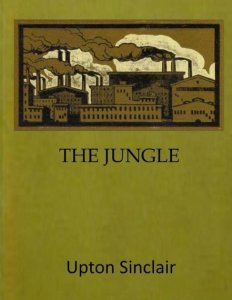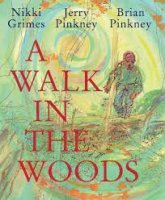"The Jungle is a 1906 novel written by the Pulitzer Prize winning journalist Upton Sinclair (1878–1968). Upton Sinclair wrote the novel to portray the changing lives of immigrants traveling to the United States and landing in Chicago or other industrialized cities.
Sinclair exposed shocking government and business corruption in this 1906 best seller. He worked undercover in the meatpacking Chicago stockyards to describe in true detail the horrific conditions among workers and the food they produced.
His work, intended as a message to promote socialism, instead caused changes in the food industry with laws signed by Theodore Roosevelt as the Pure Food and Drug Act and the Meat Inspection Act. “I aimed at the public's heart,” Sinclair wrote, “and by accident hit its stomach.”"--from the publisher
188 pages 978-1945644061 Ages 15 and up
Keyword: factories; human rights; worker's rights; slaughterhouse
********
"Upton Sinclair's dramatic and deeply moving story exposed the brutal conditions in the Chicago stockyards at the turn of the nineteenth century and brought into sharp moral focus the appalling odds against which immigrants and other working people struggled for their share of the American dream. Denounced by the conservative press as an un-American libel on the meatpacking industry, this book was championed by more progressive thinkers, including then president Theodore Roosevelt, and was a major catalyst to the passing of the Pure Food and Meat Inspection act, which has tremendous impact to this day."--from the publisher
*********
"The Jungle is a 1906 novel written by the American journalist and novelist Upton Sinclair (1878–1968). Sinclair wrote the novel to portray the lives of immigrants in the United States in Chicago and similar industrialized cities. Many readers were most concerned with his exposure of health violations and unsanitary practices in the American meatpacking industry during the early 20th century, based on an investigation he did for a socialist newspaper. The book depicts working class poverty, the lack of social supports, harsh and unpleasant living and working conditions, and a hopelessness among many workers. These elements are contrasted with the deeply rooted corruption of people in power. A review by the writer Jack London called it, "the Uncle Tom's Cabin of wage slavery." Sinclair was considered a muckraker, or journalist who exposed corruption in government and business. He first published the novel in serial form in 1905 in the Socialist newspaper, Appeal to Reason, between February 25, 1905, and November 4, 1905. In 1904, Sinclair had spent seven weeks gathering information while working incognito in the meatpacking plants of the Chicago stockyards for the newspaper. It was published as a book on February 26, 1906 by Doubleday and in a subscribers' edition."--from the publisher






